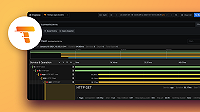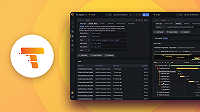This is documentation for the next version of Grafana Tempo documentation. For the latest stable release, go to the latest version.
Instrument for distributed tracing
Client instrumentation is the first building block to a functioning distributed tracing visualization pipeline. Instrumentation handles how traces are generated. To learn more about instrumentation, refer to About instrumentation.
Instrumentation is the act of modifying the source code of a service to emit span information tied to a common trace ID. Traces themselves are a meta-object, comprised of nothing but spans that hold the same ID.
To instrument your application or service, you need to:
- Set up instrumentation to generate traces
- Set up a collector to receive traces from your application


